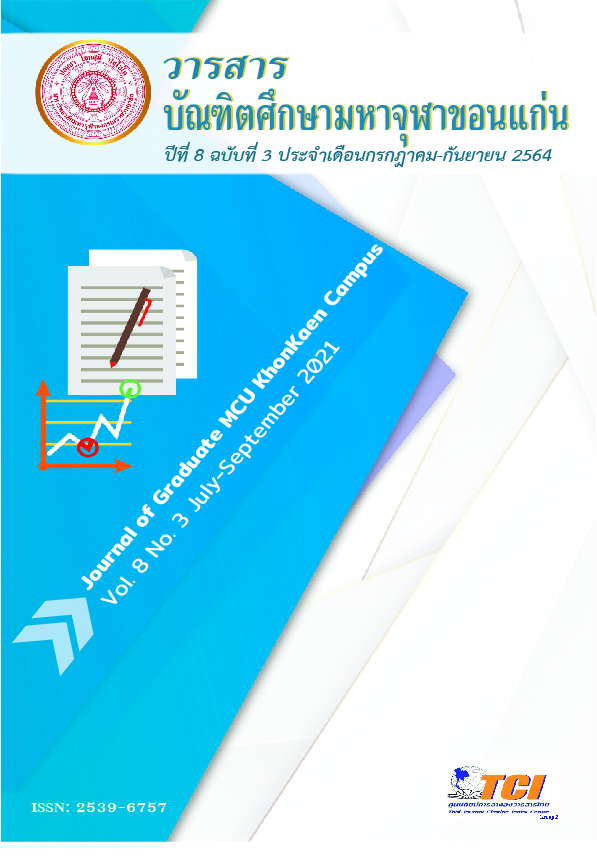AN ANALYSIS OF THE QUALITY-OF-LIFE DEVELOPMENT OF THE ELDERLY ACCORDING TO BUDDHIST ETHICS OF THE SA NOK KAEW SUBDISTRICT ADMINISTRATIVE ORGANIZATION, PHON THONG DISTRICT, ROI ET PROVINCE
Main Article Content
Abstract
The purposes of this research were: 1) to study Buddhist ethics in improving the quality-of-life of the elderly; 2) to study the quality-of-life problems of the elderly of the Sa Nok Kaew Subdistrict Administrative Organization, Phon Thong District, Roi Et Province; 3) to analyze the development of the quality-of-life of the elderly according to Buddhist ethics of the Sa Nok Kaew Subdistrict Administrative Organization, Phon Thong District, Roi Et Province. This study was qualitative research conducted by studying information from the Tripitaka, documents, and related research. There were 40 key informants.
The data were interpreted by the descriptive analysis based on the inductive method.
The results of the research were as follows:
1) Buddhist ethics in the development of quality of life is the introduction of Buddhist ethics at three levels: the beginning level, Sla (Precepts) is the physical and verbal development; the middle level, Sla-kammapatha (Course of morality actions) is the physical, verbal and mental development and the high level, Ahagika-magga (the Noble Eightfold Path) is the wisdom development in parallel with The Trisikkha (Threefold Learning) principle (Precept, Meditation, Wisdom), the Four Bhvan
(Development) principles (Physical, Moral, Mental and Intellectual Development) and the Four Iddhipda Dhammas (Paths of Accomplishment) (Aspiration, Effort, Thoughtfulness, Investigation).
2) The problematic condition of the quality-of-life problem of the elderly was found in four aspects: 1) the physical quality of life, 2) the emotional quality of life, 3) the social quality of life, and 4) the intellectual quality of life.
3) Developing the quality of life of the elderly according to Buddhist ethics is to apply the principles such as Trisikkha as a process of creating an order for living, while the Four Bhvan is used to develop a body, morality, and wisdom for a happy and sustainable coexistence in society by realizing the value and safety in the life of our
fellow human beings. The Four Iddhipda Dhammas are used as the fundamental
principle that leads to success in relation to each other, it is a process that leads to a healthy life that leads to longevity. When it has been developed in accordance with the aforementioned Buddhist ethics, the elderly will have a quality of life and lead to a quality society in all 4four dimensions: physical, mental, social, and intellectual.
Article Details
References
กรมกิจการผู้สูงอายุ. (2559). แผนนโยบายด้านผู้สูงอายุ. สืบค้นเมื่อ 20 มีนาคม 2564, จาก http://www.dop.go.th.
เจริญ นุชนิยม. (2561). การพัฒนาคุณภาพชีวิตผู้สูงอายุด้วยวิธีพุทธบูรณาการ. วารสารสันติศึกษาปริทรรศน์ มจร, 6(2), 619-631.
ปิยะดา ภักดีอำนาจ และ พรชัย ลิขิตธรรมโรจน์. (2557). แนวทางการพัฒนาการจัดสวัสดิการเพื่อผู้สูงอายุขององค์การบริหารส่วนตำบลกาตอง อำเภอยะหา จังหวัดยะลา. วารสารวิทยาการจัดการ, 31(2), 121-151.
พระธรรมปิฎก, (ป.อ.ปยุตฺโต). (2540). พุทธธรรมกับการพัฒนาชีวิต. กรุงเทพมหานคร: ธรรมสภา.
พระภูชิสสะ ปญฺญาปโชโต. (2562). การเสริมสร้างสุขภาวะตามหลักภาวนา 4 ของผู้สูงอายุ ในตำบลยางฮอม อำเภอขุนตาล จังหวัดเชียงราย. วารสาร มจร การพัฒนาสังคม, 4(1), 49-63.
พระราชบัญญัติผู้สูงอายุ พ.ศ. 2546. (2560). ราชกิจจานุเบกษา. เล่มที่ 120 ตอนที่ 130 ก (31 ธันวาคม 2546)
พระราเชนทร์ วิสารโท. (2017). บูรณาการพุทธธรรมกับระบบการดูแลสุขภาพระยะยาว สำหรับผู้สูงอายุของอำเภอศรีวิไล จังหวัดบึงกาฬ. วารสารมหาจุฬาวิชาการ, 4(2), 76-91.
ภูมิวัฒน์ พรวนสุข. (2558). แนวทางการพัฒนาคุณภาพชีวิตผู้สูงอายุขององค์กรปกครองส่วนท้องถิ่นในเขตจังหวัดแพร่. วารสารบัณฑิตวิทยาลัยพิชญทรรศน์, 10(1), 77-88.
วิพรรณ ประจวบเหมาะ. (2542). การส่งเสริมสุขภาพปีสากลว่าด้วยผู้สูงอายุ ปี 2542. รายงานการวิจัย, วิทยาลัยประชากรศาสตร์: จุฬาลงกรณ์มหาวิทยาลัย.
สถาบันวิจัยและพัฒนาผู้สูงอายุไทย. (2560). สถานการณ์ผู้สูงอายุไทย ปี 2560. กรุงเทพมหานคร: บริษัท โรงพิมพ์เดือนตุลา จำกัด.
สมเด็จพระพุทธโฆษาจารย์ (ป.อ.ปยุตฺโต). สูงอายุเป็น ก็น่าเป็นผู้สูงอายุ. มปพม.
สมบูรณ์ วัฒนะ. (2559). แนวคิดการดูแลผู้สูงอายุตามแนวพระพุทธศาสนาเถรวาท. วารสารวิชาการมนุษยศาสตร์และสังคมศาสตร์, 24(4), 173-193.
สุดารัตน์ สุดสมบูรณ์. (2557). สวัสดิการสังคมของผู้สูงอายุในประเทศไทย. วารสารเทคโนโลยีภาคใต้, 7(1), 73-82.
องค์การอนามัยโลก. (2010), ความหมายผู้สูงอายุ. สืบค้นเมื่อ 20 ตุลาคม 2562, จาก http://www.who.int
